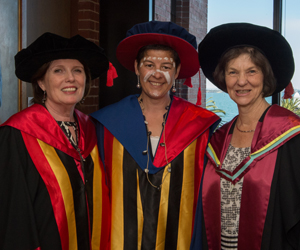Indigenous PhD trailblazer speaks for the vulnerable
Research news
Dr Deonne Basaraba, one of the first two students to receive their PhDs through the Institute of Koorie Education in 11 years, speaks for those affected by Fetal Alcohol Spectrum Disorder.
It is time we acknowledged the potential devastating effects of alcohol on unborn infants and the high incidence of this “hidden” problem in Australian schools and communities, claims Dr Deonne Basaraba, who has just gained her PhD at Deakin University’s Institute of Koorie Education (IKE) on this topic.
The Institute was established at Deakin 17 years ago, with the aim of supporting access to Higher Education for Aboriginal and Torres Strait Islander students.
The first two PhD students to complete their studies exclusively through the Institute have just graduated and are now among the just over 400 Indigenous Australians to hold a PhD. Another two are set to be conferred in the May/June ceremonies.
Institute Director Professor Liz Cameron congratulated Dr Deonne Basaraba and Dr Shirley Bennell.
“A key focus of Indigenous leaders today is to increase the aspirations of our people and one powerful way to do that is through education. If we don’t step up and, through sheer determination and resilience, reach for a better education, we’ll never be able to make change,” she said.
After completing her Bachelor of Education at the Institute over a decade ago, Dr Basaraba was working as a special education teacher in Mildura when she discovered the scale and lack of understanding about the unique educational needs of children and young people presenting with Fetal Alcohol Spectrum Disorder (FASD).
“FASD can affect people of any race, and research undertaken within Australia suggests that more children are born every year with FASD than with Autism, Spina Bifida, Cerebral Palsy, Down Syndrome and SIDS combined,” she said.
“However, due to the stigma attached to this disorder, the lack of knowledge and the broad spectrum of symptoms it can present with, there is very little understanding of the condition within Australian education departments or the support required in Australian schools for children and young people presenting with FASD or their families.”
At the coal face, Dr Basaraba became determined to discover as much as she could about the condition and to raise awareness about the educational needs of students affected by prenatal alcohol exposure.
“I began looking for information on the condition and the educational needs of students presenting with FASD and found a gap in knowledge and understanding of the unique learning needs of students with FASD,” she said.
“Understanding that prenatal exposure to alcohol is potentially harmful is relatively new. One of the first times it was publically acknowledged in Australia was in an article in the ‘Australian Women’s Weekly’ in 1979. However, the issue became buried again and there was very little research until recently. There are now three diagnostic clinics in Australia, which have all been established in the past two years.”
FASD is a brain injury resulting from maternal alcohol consumption during pregnancy. The alcohol consumed by mothers crosses the placenta, entering the blood stream of the foetus and causing a constellation of physical, behavioural and cognitive abnormalities which often effect the academic performance and behaviours of students presenting with FASD.
Symptoms could include sensory processing disorders, poor cognitive function, hyperactivity, poor coordination and/or poor memory. The part of the brain affected depends on the developmental stage of the foetus at the time of exposure.
The data collected throughout Dr Basaraba’s research highlighted that Australia lacked a national approach to FASD and a paucity of research policy and strategy in relation to the educational needs of those affected by prenatal exposure to alcohol. She suggests that without national research policy or an education strategic plan, teachers will continue to be ill prepared and unable to meet the needs of students presenting with FASD.
Drawing from the data, she developed the Framework for Achieving Inclusion of Australian Students with FASD, which strongly argues for systematic leadership from government through policy and actions that provide new and improved practices and principles for the respectful inclusion of students presenting with FASD and their families.
“Although awareness around FASD is growing, it is imperative that it is recognised as a disability and that schools have access to funding in order to support the learning needs of students presenting with FASD,” said Dr Basaraba.
“Education departments across Australia play a pivotal role in the successful inclusion of FASD students, thus policies and professional development programs need to be set in place to ensure Australian educationalists are equipped with the knowledge and resources required to support the unique educational needs of students with FASD.”
Dr Basaraba is now using the skills she has learnt to help other Aboriginal and Torres Strait Islander students build their research skills, working for the Institute of Koori Education as Unit Chair for the Graduate Diploma of Indigenous Research.
“The Institute is so important, particularly its Community-Based Delivery model,” she said.
“We have students from around Australia and the Torres Strait Islands, who attend for intensives and stay at our own residential setting Kitjarra. During intensives, classes are conducted at the culturally designed Institute, which sits on Wadawurrung Country, and when students return to their own communities, they complete their studies with support from Deakin Cloud.”
Share this story

Key Fact
From left: Prof Brenda Cherednichenko, Executive Dean, Faculty of Arts and Education, Dr Deonne Basaraba and Prof Christine Ure, Head, School of Education.
